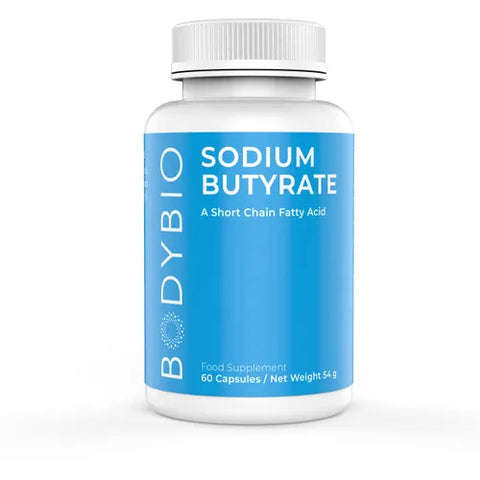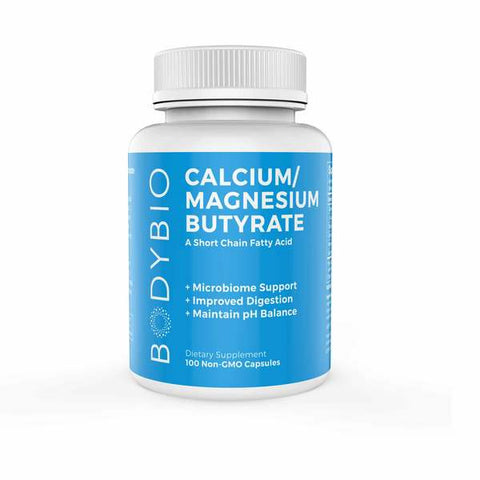Butyrate | Gut Health Supplement
Size: 100 Capsules | Serving Size: 2 Capsules | Servings per Container: 50
Butyrate is an essential end product of a healthy microbiome. Primarily, it fuels your gut cells, strengthening the gut lining and healing leaky gut.* BodyBio Butyrate is available in two unique formulations: Calcium/Magnesium Butyrate and Sodium Butyrate.
Please carefully review which Butyrate type and quantity you would like below before adding to cart.
Which Butyrate is right for me?
Calcium Magnesium
Sodium
0-2 Weeks
Colonocytes (gut cells) are energized. Some people notice a difference within the first day of taking butyrate while others notice improvement in their digestive health within the first week or so. As butyrate levels build up over time, you will notice more positive changes in digestion and gut health.
2-4 Weeks
Digestive function continues to improve, leaky gut resolves, healthy gut flora is reestablished, and blood sugar peaks and valleys become more like gentle, rolling hills. All while keeping you regular with well-formed stools.*
4 Weeks+
Gradually builds a healthy gut structure over time, supporting your immune resistance, subsiding systemic inflammation in the gut, banishing brain fog, helping with weight regulation, and improving your overall health.
Product Information & FAQ's
Butyrate: Your #1 Gut Health Postbiotic
Simply put, butyrate is an essential end product of a healthy microbiome.
Your gut bacteria make butyrate first and foremost to fuel and energize the gut lining, which allows the gut to easily absorb nutrients into the bloodstream while combating permeability, keeping waste and toxins out of the bloodstream — and then move everything right along to be *ahem* disposed of. (Bye, constipation!)
But that’s not the whole story — butyrate is an effective gut health supplement with full-body benefits. It’s also backed by over 5000 scientific studies, including human clinical trials.
When butyrate is absorbed into the bloodstream, it quickly goes to work throughout the body.
- It supports a healthy inflammation response, protecting the body from disease while regulating immune function.*
- It helps balance insulin and blood sugar levels.*
- It clears brain fog and boosts brain function.*
- It supports healthy DNA and cell differentiation, our cells’ ability to change into a specific type like a heart cell or a kidney cell.*
All very important stuff, running life on a cellular level.
The thing is, most of us aren’t making enough butyrate naturally. Some people may hardly have any butyrate-producing bacteria in their gut due to low fiber intake or repeated antibiotic use. And these days, it's easy for the body to use up butyrate quickly, trying to calm inflammation, fighting off hundreds of toxins and pollutants in our environment, keeping the microbiome from going rogue, and holding the gut together.
This is why they developed BodyBio Butyrate — a simple formulation (butyric acid + minerals) to protect your gut at the cellular level.
Calcium/Magnesium Butyrate- Butyric Acid, Calcium Hydroxide, Magnesium Hydroxide, Medium Chain Triglycerides (MCT), Hydroxyproply Methyllulose and Purified Water.
Sodium Butyrate- Butyric Acid, Sodium Hydroxide, Medium Chain Triglycerides (MCT), Hydroxypropyl Methylcellulose and Purified Water.
Quality matters! No fillers or additives. Butyrate naturally occurs with a distinctive, fermented scent. (Ok, we’re trying to make it sound nice, but it can be a little smelly.) Some people are more sensitive to this scent than others, but the odor means it's premium quality and ready to work. BodyBio Butyrate is free of wheat, gluten, yeast, corn, soy, dairy, artificial colors, and resins.
1-2 capsules with food, unless otherwise suggested by your Healthcare Professional.
Is Butyrate enterically coated? How do I know it will reach the gut?
The capsules of butyrate are vegetarian, made from plant cellulose. The butyrate powder within is enterically coated. We want to make sure that butyrate survives exposure to stomach acid and gets to the colon, where it will be most effective in supporting gut cells. Here, an approach has been devised to tackle the challenge of butyrate delivery—coating with a vegetable fat, commonly called a medium-chain triglyceride. The reasoning behind this is that a significant part of the butyrate will be released only when lipase (fat digesting enzyme) is secreted in the duodenum, the first part of the small intestine
What’s the difference between Sodium Butyrate and Calcium/Magnesium Butyrate?
The only difference between the two forms of BodyBio Butyrate is the minerals used to create the butyrate salt: either sodium + butyric acid, or calcium + magnesium + butyric acid. Other than that there is no difference between the two. We offer these two options because most scientific research on butyrate is conducted with sodium butyrate. This is what we recommend for most people. However, some people wish to avoid any extra sodium intake, so we created the calcium/magnesium version as an alternative. Both are equally effective.
Can I take more than two capsules a day?
Yes, many people take multiple doses, in the morning and evening, or even 1-2 caps with each meal. It depends on your gut and how you feel with butyrate. If you are not seeing improvement in your gut health at two caps per day, we recommend increasing your dose by one cap until you do. You may wish to split these doses throughout the day, or take them all at once — listen to your gut. When in doubt, consult your practitioner for their advice regarding dosage and timing.
What time of day should I take butyrate?
You can take butyrate any time of day. Some people find that taking butyrate before bed helps them have better digestion the following morning. Some people prefer to take butyrate in the morning to set them up for the day ahead. Experiment with what works best for you
Why do you use butyric acid instead of tributyrin?
BodyBio Butyrate is simply butyrate, which is butyric acid + minerals, in our case sodium or calcium/magnesium.. Butyric acid, butyrate and tributyrin are ingredients you may see in other butyrate supplements — same purpose, different characteristics.
Is it supposed to smell?
Yes, and we do not use any additives or fillers to mask the scent. Butyrate is quite infamous for its scent because it is a molecule naturally produced by the body to feed colon cells. Certain gut bacteria create butyrate via a fermentation process, so, naturally, it doesn’t smell good. Substances sometimes added to butyrate in order to control its aroma interfere with butyrate’s benefits.
We use butyric acid aka butanoic acid, a short-chain fatty acid with four carbon atoms at its heart (found naturally in butter, hence its name). As an acid, it has a low pH so we compound it with an alkali (either sodium or calcium/magnesium), a combination that forms a salt + water. At this stage, we no longer have butyric acid, but butyrate, a buffered form of butyric acid.
This formulation is quick to break down once it reaches the gut and immediately gets to work feeding your gut cells. And it provides a sprinkling of extra minerals with either the sodium or calcium/magnesium forms. Sodium butyrate is what is used in almost all scientific studies on butyrate, but some people want to avoid extra sodium intake, so we offer the calcium/magnesium option as an alternative. Both are equally effective.
Tributyrin, which we use in Gut+, is another form of butyrate. Tributyrin is not as quickly broken down in the gut, meaning more will be absorbed into the bloodstream to be used throughout the body. If you’re looking for even more of the systemic effects of butyrate, such as metabolic, brain, and immune support, Gut+ may be a better option for you. However, both butyrate and tributyrin will have these systemic effects as well as supply fuel to the gut lining.
We must also account for the individuality of your unique gut environment and any systemic issues present, so the body may prioritize the use of either butyrate or tributyrin wherever it sees fit
Is butyrate similar to a probiotic?
No, butyrate is NOT bacteria but a short-chain fatty acid (SCFA). It’s made in the lower colon by probiotic bacteria and taken up by the colonocytes, the cells that line the colon. It then becomes an important food for those cells. A lack of good bacteria in the colon, due to antibiotic use for example, can lead to an insufficient supply of butyrate
What is the MCT oil in Butyrate?
MCT oil in Butyrate is derived from palm, palm kernel and/or coconut oil.
Can I get Butyrate from my food?
You can! However, it is unlikely that you get enough butyrate from your food sources to be physiologically beneficial, making butyrate supplementation a better option for gaining significant health benefits. Butyrate can also be made in the gut by consuming resistant starch, which normally comes from the skins of legumes, or underripe bananas — not foods that are commonly consumed.
Is Butyrate needed on Paleo/Keto diets?
Diets like Paleo and Keto can be deficient in fiber and resistant starch, and therefore, low in butyrate if proper dietary guidelines are not followed. When a Paleo diet is properly followed, an individual should be consuming between 9-12 cups of phytonutrient and fiber-rich plant foods including, green plantains, green bananas, sunchokes, artichokes, cooked and cooled potatoes, etc. in order to produce ample levels of butyrate. The problems arise when individuals focus exclusively on animal protein and fat while neglecting these plant foods/fibers.
Nine cups of vegetables contain roughly 72 grams of fiber. Remember, we must also consider the health of the individual's microbiome. This factor will also influence butyrate production.
The ability for your body to synthesize butyrate depends on several factors. Dietary fiber and resistant starch intake are critical, but we also need a plethora of probiotic bacteria in the colon to ferment the fiber that we eat and synthesize it into butyrate, acetate, and propionate (other important SCFAs). The state of the microbiome, the impact of drugs, alcohol, etc. factors into each individual's ability to produce short-chain fatty acids like butyrate.
Chronic overeating via processed, nutrient-void foods high in energy, fat and sugar is the norm amongst the majority of North Americans. This dietary regimen creates a situation where gut health is greatly compromised and therefore, butyrate production is greatly impaired. One cannot go wrong eating a nutrient-dense diet filled with high quality animal protein and colorful, fiber-rich foods.
It is important to note that most studies on butyrate are done via butyrate supplementation. Regardless of whether you are making adequate butyrate in the gut, we don't think you can go wrong by supporting your body with a top-up of butyrate through supplementation. Butyrate supplementation has been shown to support a healthy gut inflammation response, improve gut integrity, regulate the immune system, stabilize mood, and improve the gut/brain axis.
Formulated to:
- Heal and seal a leaky gut*
- Promote detoxification*
- Regulate immune function*
- Reduce inflammation*
- Boost mood & energy*
- Support healthy blood sugar regulation & metabolic health*
We Like Body Bio Because:
- They are a family business
- Commitment to High Quality Raw Materials
- They produce In house
Policies
Affiliate Program
Contact information
whats app: 91265482 | hello@detox-me.asia
Pick Up Location: Kinwick Centre
10F, 32 Hollywood Road
Central, Hong Kong SAR
Payment methods
WAVEWORKS LTD
10th Floor, Kinwick Centre
32 Hollywood Rd
Central, Hong Kong
Store Hours
Mon-Fri: 10:00 - 17:00
Sat: 10:00 - 13:00
Sun: Closed
What to expect at pickup
Closed
Closing at 5pm
Closing at 5pm
Closing at 5pm
Closing at 5pm
Closing at 5pm
Closing at 1pm
16th Floor, Room 1602
1 Duddell Street
Central, Hong Kong
Store Hours
Sun: Closed
Mon-Fri: 9:00 - 18:30
Sat: 9:00 - 13:00
What to expect at pickup
Closed
Closing at 18:30
Closing at 18:30
Closing at 18:30
Closing at 18:30
Closing at 18:30
Closing at 13:00



